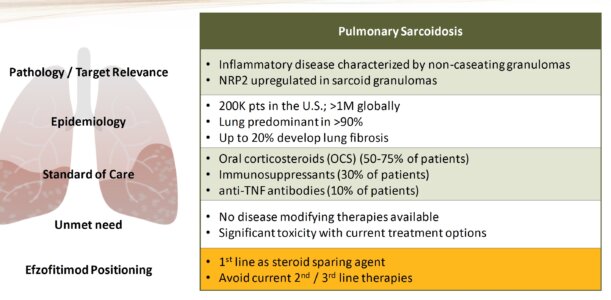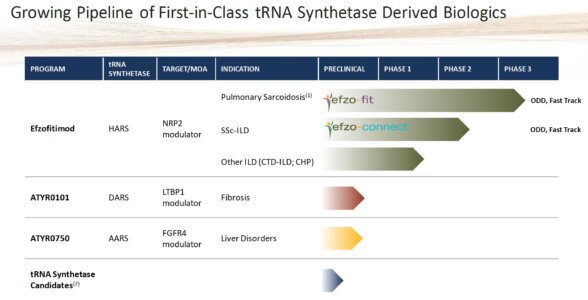aTyr Pharma (ATYR) is developing a new area of biology that re-tunes the immune system by targeting innate immunity at the site of inflammation. The company’s novel tRNA Synthetase Platform produces disease-modifying molecules that promise to knock down important inflammatory and fibrotic markers in a variety of indications, starting with pulmonary sarcoidosis.
The company’s near-term program is a first-in-class biologic immunomodulator for interstitial lung disease (ILD) with focus on pulmonary sarcoidosis, an orphan disease. It is also the first company to incorporate a steroid sparing clinical trial design that has been validated in a positive Phase 2 trial with meaningful dose escalation efficacy and a very good safety profile. It is currently in Phase 3 and is expected to be fully enrolled in the coming weeks with a readout in 2025. There is no established FDA regulatory pathway for approval of a drug in pulmonary sarcoidosis. The goal is to advance its lead program, Efzofitimod, as the standard-of-care (SOC) for ILD.
The various novelties this company enjoys are likely the source of investor doubt about its potential, in addition to its small market cap – and even smaller enterprise value. I offer analysis that the unanswerable questions about ATYR can be contained enough to reward speculative investors with an asymmetric shot at a large, multi-billion dollar TAM against an EV of approximately $50 million.
Lead Program: Efzofitimod
Disease Indication:
ATYR’s lead program is Efzofitimod, a novel biologic for the treatment of pulmonary sarcoidosis, a chronic inflammatory disease characterized by the formation of granulomas (clusters of inflammatory cells) in the lungs, for which there is no disease modifying therapy. These granulomas can interfere with lung function, leading to symptoms such as cough, shortness of breath, and fatigue. Pulmonary sarcoidosis can progress to fibrosis, or scarring, of lung tissue, further compromising respiratory function. Efzofitimod targets innate immunity at the site of inflammation. The current SOC is steroids which come with their own cumulative burden of toxicity.
Mechanism of Action (MOA):
Efzofitimod targets the neuropilin-2 (NRP2) receptor, which plays a key role in immune system regulation. By binding to NRP2, Efzofitimod modulates the activity of immune cells, specifically macrophages and monocytes. These cells are central to the inflammatory response seen in conditions like pulmonary sarcoidosis. When Efzofitimod binds to NRP2, it disrupts the interactions between NRP2 and its natural ligands, which are responsible for promoting inflammatory pathways. This disruption leads to a reduction in the activation and migration of macrophages and monocytes to sites of inflammation, thereby disrupting the cascading of disease progression. As a result, the overall inflammatory response is diminished.
By quiescing macrophages and monocytes, Efzofitimod effectively reduces the secretion of pro-inflammatory cytokines and chemokines, which are signaling molecules that perpetuate inflammation and recruit additional immune cells. This targeted immunomodulation helps to control and resolve inflammation without ablating the immune system, as traditional therapies like steroids do. Chemically, Efzofitimod is a fusion protein composed of the immunoglobulin Fc region linked to a portion of histidyl-tRNA synthetase (HARS). This structure is designed to interact specifically with NRP2. The Fc region of the fusion protein ensures stability and extended half-life in the bloodstream, while the HARS-derived component is responsible for the high-affinity binding to NRP2. The binding of Efzofitimod to NRP2 inhibits the interaction between NRP2 and its natural ligands, which are typically involved in promoting inflammatory pathways. By blocking these interactions, Efzofitimod reduces the activation and migration of immune cells to sites of inflammation, thereby decreasing the overall inflammatory response.
Additionally, this interaction helps to mitigate the fibrotic processes that often accompany chronic inflammation, potentially reversing or halting the progression of tissue fibrosis.

Safety
Any immunomodulating therapy has the potential to produce off-target effects that often cannot be anticipated prior to clinical trials. Efzofitimod has generally been well-tolerated in clinical trials, with common adverse events (AEs) being mild to moderate in severity. To date, no significant off-target effects have been reported. In the Phase 2 trial, the adverse events reported were primarily mild to moderate, and serious adverse events (SAEs) were infrequent and not necessarily related to Efzofitimod. The number of adverse events varies, but no significant safety concerns have emerged. Dose escalations for Efzofitimod were evaluated for safety and tolerability. Higher doses led to an increase in the frequency of some adverse events, but these side effects were dose-dependent and manageable. No dose-limiting toxicities were observed.
Development History and Clinical Trials
- Preclinical models demonstrated Efzofitimod’s potential to reduce inflammation and fibrotic processes. The drug showed promise in decreasing the activation of inflammatory pathways while also promoting tissue repair and fibrosis resolution.
- Phase 1 Clinical Trial: This initial trial focused on assessing the safety, tolerability, and pharmacokinetics (PK) of Efzofitimod in healthy volunteers. The results indicated that the drug was well-tolerated with a favorable safety profile, setting the stage for further clinical development.
- Phase 1b/2a Clinical Trial: Conducted in patients with pulmonary sarcoidosis, this trial aimed to evaluate the safety and preliminary efficacy of Efzofitimod. The study demonstrated that the drug could reduce steroid usage while improving functional endpoints. Notably, patients exhibited improvements in forced vital capacity (FVC), a measure of lung function, as well as quality of life measures, including reduced cough, shortness of breath, and fatigue.
- Proof of Concept (POC): In September 2021, the company announced positive results and clinical proof-of-concept from a double-blind, placebo-controlled Phase 1b/2a clinical trial in 37 patients with pulmonary sarcoidosis. The study was designed to evaluate the safety, tolerability, immunogenicity and preliminary efficacy of three doses of intravenous (IV) Efzofitimod, 1.0, 3.0 and 5.0 mg/kg, in the context of a forced steroid taper. Efzofitimod was safe and well-tolerated at all doses administered with no serious drug-related adverse events or signal of immunogenicity. Additionally, the study demonstrated consistent dose response for Efzofitimod on key efficacy endpoints and improvements compared to placebo, including measures of steroid reduction, lung function, pulmonary sarcoidosis symptom measures and inflammatory biomarkers. These data were subsequently presented at the American Thoracic Society (ATS) International Conference and published in the peer-reviewed journal CHEST. Today, the company has de-risked its PK profile by discovering a clinical understanding of where this compound can be most useful and proving up the MOA through observed efficacy.
Phase 3 EFZO-FIT Study: The EFZO-FIT study is a global Phase 3 randomized, double-blind, placebo-controlled trial designed to evaluate the efficacy and safety of Efzofitimod in patients with pulmonary sarcoidosis. It is the first Phase 3 study for sarcoidosis in history. The study’s primary endpoints include:
- Primary: The study aims to demonstrate that Efzofitimod can reduce the need for steroids, minimizing the toxic effects associated with long-term steroid use.
- Functional Endpoints: Secondary functional endpoints include improvements in FVC, reflecting enhanced lung function.
- Quality of Life Measures: The study will assess improvements in patient-reported outcomes, such as reductions in cough, shortness of breath, and fatigue, which are critical for overall quality of life.

Value of First-in-Class Biologic Immunomodulator for Interstitial Lung Disease (ILD)
Efzofitimod, as a first-in-class biologic immunomodulator, holds significant value for the treatment of ILD, a group of disorders characterized by progressive lung inflammation and fibrosis. ILDs, including pulmonary sarcoidosis, often have limited treatment options, with current therapies primarily relying on immunosuppressive agents like steroids that can cause severe side effects with long-term use. Efzofitimod offers a novel therapeutic approach by specifically targeting underlying immune pathways involved in the disease process. This targeted mechanism can lead to more effective and safer treatments, reducing the reliance on broad-spectrum immunosuppressants and potentially improving patient outcomes. The ability to both attenuate inflammation and address fibrotic processes without introducing new safety concerns represents a significant advancement in the management of ILD, potentially transforming the SOC and addressing a substantial unmet medical need. There are other indications under the ILD umbrella the company intends to pursue. In fact, there are over 200 different types of ILD, with four main types comprising roughly 80% of all patients: pulmonary sarcoidosis, chronic hypersensitivity pneumonitis (CHP), connective tissue disease-associated ILD (CTD-ILD) and idiopathic pulmonary fibrosis (IPF).
Cash & Catalysts
As of March 31, 2024, the company reported $87.7m in cash, restricted cash, cash equivalents and investments, with a burn rate of $10-12 million per quarter. The company projects cash runway through filing of Biologics License Application (BLA) for Efzofitimod in pulmonary sarcoidosis.
In 2022, ATYR entered into a significant partnership with Kyorin Pharmaceutical Co., Ltd. of Japan, aimed at developing and commercializing Efzofitimod in Japan. ATYR received an upfront payment from Kyorin of $10 million as part of the total potential value of $175 million. The deal also includes various development, regulatory, and commercial milestone payments. ATYR will earn tiered royalties on net sales of Efzofitimod in Japan, reflecting the drug’s commercial potential in this market. In terms of responsibilities, Kyorin Pharmaceutical will handle the development, regulatory approvals, and commercialization of Efzofitimod in Japan.
The Phase 3 EFZO-FIT study will be fully enrolled in July 2024 with readouts in Q3 2025.
The Phase 2 trial may have a subset readout by the end of 2024.
Ownership: Federated and Fidelity own approximately 30% of the stock. And there has been some modest insider buying in the last 12 months.
TAM
Approximately 200k Americans and 1.2 million people globally currently live with pulmonary sarcoidosis. The prognosis for patients with pulmonary sarcoidosis ranges from benign and self-limiting to chronic, debilitating disease and death. Current SOC for patients with sarcoidosis involves treatment with corticosteroids and other immunosuppressive therapies, with limited evidence of efficacy and serious long-term toxicity. There remains a need for novel treatment options for sarcoidosis patients with progressive disease.
The company assumes approximately 20k of the 200k are treated with steroids in the USA. So pricing of $100k per patient produces an addressable market of $2 billion annually for ATYR’s lead program.
ATYR’s secondary adjacent program (Efzofitimod, Phase 2 targeting efficacy in lung function) in systemic sclerosis (SSc)-ILD addresses an autoimmune disease characterized by scarring of skin and other organs. There are approximately 60k Americans and 1.5 million globally suffer from SSc-ILD. There are no existing disease modifying therapies available. I’m not assuming any revenues from this program.
Approval of Efzofitimod for pulmonary sarcoidosis and SSc-ILD could open the molecule up to systemic use.
Growing Pipeline for tRNA Synthetase Platform:
Efzofitimod has shown anti-inflammatory and anti-fibrotic effects in multiple ILD models. Pre-clinical indications are: Fibrosis, MOA for LTB1 modulator; and liver, MOA for FGFR4. There are other phenotypic screens targeting a wide variety of indications based on signals from animal models.
ATYR’s current IP focus is directed to protein compositions from all 20 tRNA synthetase genes. It has a research collaboration with Dualsystems Biotech AG aims to identify target receptors for tRNA synthetases.
Factors Influencing Commercialization
FDA and EU Designations for ATYR’s Therapeutic Candidates FDA Designations (Efzofitimod):
- Orphan Drug Designation (ODD) for the treatment of pulmonary sarcoidosis: Granted on January 3, 2020
- Fast Track Designation for the treatment of pulmonary sarcoidosis: Granted on April 12, 2021
- ODD for the treatment of systemic sclerosis-associated interstitial lung disease (SSc-ILD): Granted on April 12, 2022
- Fast Track Designation for the treatment of systemic sclerosis-associated interstitial lung disease (SSc-ILD): Granted on September 13, 2022
EU Designations (Efzofitimod):
- ODD for the treatment of sarcoidosis, including pulmonary sarcoidosis: Granted on November 27, 2020
- ODD for the treatment of systemic sclerosis (SSc): Granted on June 22, 2023
Expanded Access:
In February 2024, the company announced an individual patient Expanded Access Program (EAP). This EAP was initiated based on blinded EFZO-FIT study investigator and patient participant feedback. The program is designed to allow access for patients who complete the Phase 3 EFZO-FIT study and wish to receive treatment with Efzofitimod outside of the clinical trial. The administration of Efzofitimod as part of the EAP will occur independent of the EFZO-FIT study protocol, and ATYR, principal investigators and patients will remain blinded to the treatment that occurred as part of the EFZO-FIT study.
As this EAP will occur independent of the EFZO-FIT study, this program is not an open-label extension (OLE) and no long-term data will be collected by us. The fact that initially 12 investigators, and now more than 30, have requested Efzofitimod for their patients under the EAP is highly significant for several reasons. And this is after several positive data and safety monitoring board (DSMB) reviews.
First, the growing number of requests from investigators indicates strong clinical interest and confidence in Efzofitimod’s therapeutic potential. Investigators are choosing to administer the drug outside the controlled trial setting because they believe it could provide substantial benefits to their patients. This increased use of Efzofitimod in EAPs can serve as an informal real-world efficacy signal. When multiple investigators see positive outcomes in their patients, it supports the hypothesis that the drug is effective across a broader population than initially studied. Additionally, the expanded access program provides further confirmation of Efzofitimod’s safety profile.
Finally, demonstrating real-world efficacy and safety through expanded access can positively influence regulatory bodies, suggesting a favorable commercial outlook.
Scientific Journals & Publications
ATYR’s drug development efforts, particularly with Efzofitimod, have been highlighted in several reputable scientific journals, offering peer-reviewed validation of the company’s potential and advancements in treating pulmonary sarcoidosis and other ILDs.
In Frontiers in Pharmacology, publications have detailed the preclinical and early clinical findings of Efzofitimod. These articles emphasize the drug’s novel mechanism of action targeting neuropilin-2 (NRP2) and its ability to modulate immune responses, specifically quiescing macrophages and monocytes. The research presented underscores the dual anti-inflammatory and anti-fibrotic effects of Efzofitimod, making it a promising candidate for conditions characterized by chronic inflammation and fibrosis.
Science Translational Medicine has featured studies on the translational aspect of Efzofitimod, highlighting its journey from bench to bedside. The articles illustrate how preclinical models demonstrated significant reductions in inflammation and fibrosis, leading to subsequent clinical trials. These publications discuss the drug’s ability to reduce steroid dependence while improving lung function and quality of life in patients, thus providing a robust proof of concept for its therapeutic efficacy.
In the Chest Journal, which focuses on respiratory and critical care medicine, published the clinical trial results of Efzofitimod . These studies provide detailed insights into the drug’s safety, tolerability, and efficacy in patients with pulmonary sarcoidosis. The findings include significant improvements in forced vital capacity (FVC), reduced symptoms like cough and shortness of breath, and enhanced overall quality of life for patients. The journal articles also discuss the drug’s potential to transform the SOC for sarcoidosis by offering a targeted treatment option with fewer side effects compared to traditional therapies.
Intellectual Property
ATYR has over 220 issued patents or allowed patent applications in the field of extracellular tRNA synthetase biology, and their receptors and related biology. Its Efzofitimod patent portfolio is comprised of a number of patent families related to the iMod domain, related splice variants, combinations with other therapeutics, and next-generation product forms with modified therapeutic activity or PK characteristics. The patent also includes claims related to the methods of using Efzofitimod to treat diseases characterized by inflammation and fibrosis. This is particularly important for conditions such as pulmonary sarcoidosis and other ILDs, where chronic inflammation leads to progressive scarring of lung tissue. Additionally, the patent encompasses the processes involved in producing Efzofitimod. The Efzofitimod patent portfolio currently includes four patent families and includes issued patents in the US, Japan, China, Australia, Hong Kong and Europe. Expiration occurs in 2036 and later. ATYR’s pipeline of extracellular tRNA synthetase proteins is covered by a series of 21 patent families, which are directed to all 20 human cytosolic tRNA synthetases.
Paul Schimmel
Paul Schimmel is a prominent figure in the biotechnology field, recognized for his contributions as a scientist, entrepreneur, and investor. Schimmel is a distinguished professor at The Scripps Research Institute and has an extensive background in biochemistry and molecular biology. Academic and Professional Background
- Education: Paul Schimmel earned his Ph.D. in biophysics from the Massachusetts Institute of Technology (MIT).
- Academic Roles: He has held various academic positions, notably as a professor at MIT and The Scripps Research Institute.
Paul Schimmel has played significant roles in founding several influential biotechnology companies:
- Alkermes (ALKS): Alkermes is a biopharmaceutical company that focuses on developing innovative medicines for central nervous system diseases and other therapeutic areas.
- Cubist Pharmaceuticals: Known for developing antibiotics, Cubist Pharmaceuticals made significant strides in treating severe bacterial infections before being acquired by Merck & Co. in 2015.
- Repligen (RGEN): Repligen specializes in bioprocessing technologies and systems for the biopharmaceutical industry.
- Alnylam Pharmaceuticals: Alnylam is a leader in RNA interference (RNAi) therapeutics, developing treatments for genetically defined diseases.
Role in ATYR:
Paul Schimmel is a founder and remains a shareholder in ATYR (3.70%). He has shown continuous confidence in the company by increasing his investments via open market purchases. Efzofitimod reflects Paul Schimmel’s expertise in molecular biology and protein chemistry. Schimmel’s deep understanding of protein synthesis and function is evident in the molecule’s intricate structure and diverse functional groups. His early research on aminoacyl-tRNA synthetases, crucial for protein synthesis, has influenced Efzofitimod’s design, particularly its ability to modulate the immune response with precision.
Efzofitimod graphic:

The ideas presented on this site do not constitute a recommendation to buy or sell any security. Investors are advised to conduct their own independent research into individual stocks before making a purchase decision. In addition, investors are advised that past stock performance is not indicative of future price action. You should be aware of the risks involved in stock investing, and you use the material contained herein at your own risk. Neither SYNTHETIC.COM nor any of its contributors are responsible for any errors or omissions which may have occurred. The analysis, ratings, and/or recommendations made on this site do not provide, imply, or otherwise constitute a guarantee of performance. SYNTHETIC.COM posts may contain financial reports and economic analysis that embody a unique view of trends and opportunities. Accuracy and completeness cannot be guaranteed. Investors should be aware of the risks involved in stock investments and the possibility of financial loss. It should not be assumed that future results will be profitable or will equal past performance, real, indicated or implied. The material on this website is provided for information purpose only. SYNTHETIC.COM does not accept liability for your use of the website. The website is provided on an “as is” and “as available” basis, without any representations, recommendations, warranties or conditions of any kind.

